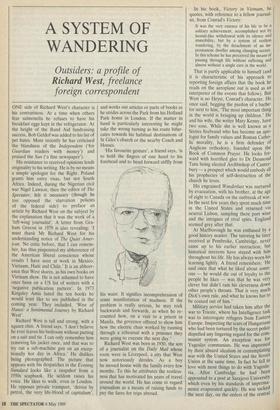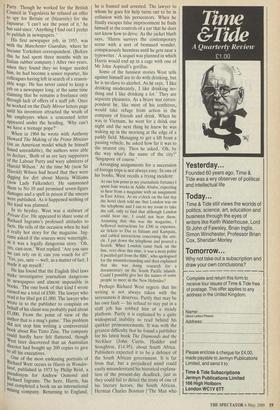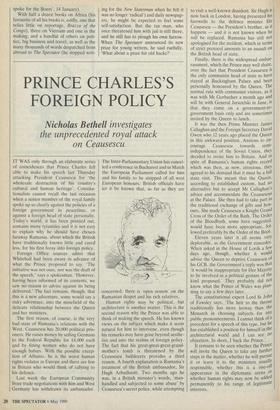A SYSTEM OF WANDERING
Outsiders: a profile of
Richard West, freelance
foreign correspondent
ONE side of Richard West's character is his contrariness. At a time when others fear salmonella he refuses to have his breakfast eggs kept in the refrigerator. At the height of the Band Aid fundraising success, Bob Geldof was added to his list of pet hates. More recently he has criticised the blandness of the Independent ('for Guardian readers with money') and praised the Sun ('a fine newspaper').
His resistance to received opinions lends originality to his writing. He is by no means a simple apologist for the Right. Poland grants him entry visas, but not South Africa. Indeed, during the Nigerian civil war Nigel Lawson, then the editor of The Spectator, felt it necessary (though. he too opposed the starvation policies of the federal side) to preface an article by Richard West on the subject by the explanation that it was the work of a left-wing journalist'. A letter from Gra- ham Greene in 1979 is also revealing: 'I must thank Mr Richard West for his understanding notice of The Quiet Amer- ican. No critic before, that I can remem- ber, has thus pinpointed my abhorrence of the American liberal conscience whose results I have seen at work in Mexico, Vietnam, Haiti and Chile.' It is an abhorr- ence that West shares, as his own books on Vietnam show. He is not ashamed to have once been on a US list of writers with a 'negative publication pattern'. In 1973 Kingsley Amis listed the ten books he would least like to see published in the coming year. They included, 'West of Hanoi: a Sentimental Journey by Richard West'.
Richard West is tall and strong, with a square chin. A friend says, 'I don't believe he ever leaves his bedroom without putting on a suit and tie. I can only remember him removing his jacket once, and that was to try out a sub-machine gun on an excep- tionally hot day in Africa.' He dislikes being photographed. The picture that appears with his despatches in the Evening Standard looks like a snapshot from a 1950s scapbook. He seldom raises his voice. He likes to walk, even in London. He opposes private transport, 'driven by petrol, the very life-blood of capitalism',
and works out articles or parts of books as he strides across the Park from his Holland Park home in London. If the matter in hand is particularly interesting he might take the wrong turning as his route bifur- cates towards his habitual destinations of St Giles's church or the nearby Coach and Horses.
'His favourite gesture', a friend says, 'is to hold the fingers of one hand to his forehead and to bend forward stiffly from his waist. It signifies incomprehension of some manifestation of madness. If the problem is really serious, he may rock backwards and forwards, as when he re- counted how, on a visit to a prison in Manila, the governor offered to show him how the electric chair worked by running through a rehearsal with a prisoner they were going to execute the next day.'
Richard West was born in 1930, the son of a journalist on the Daily Mail whose roots were in Liverpool, a city that West now notoriously derides. As a boy he moved house with the family every few months. To this he attributes the restless- ness that has motivated his years of travel around the world. He has come to regard journalism as a means of raising funds to pay the fares for trips abroad. In his book, Victory in Vietnam, he quotes, with reference to a fellow journal- ist, from Conrad's Victory:
It was the very essence of his life to be a solitary achievement, accomplished not by hermit-like withdrawal with its silence and immobility, but by a system of restless wandering, by the detachment of an im- permanent dweller among changing scenes. In this scheme he has perceived the means of passing through life without suffering and almost without a single care in the world.
That is partly applicable to himself (and it is characteristic of his approach to reporting foreign affairs that the book he reads on the aeroplane out is used as an interpreter of the events that follow). But West is no Heyst, Conrad's character. He once said, begging the pardon of a bache- lor next to him, 'The most important thing in the world is bringing up children.' He and his wife, the writer Mary Kenny, have two sons. While she is well known as a Sixties firebrand who has become an apo- logist for family values and Roman Catho- lic morality, he is a firm defender of Anglican orthodoxy, founded upon the Book of Common Prayer. He looks for- ward with horrified glee to Dr Desmond Tutu being elected Archbishop of Canter- bury — a prospect which would embody all his prophecies of self-destruction of the church he loves.
His engrained Wanderlust was nurtured by evacuation, with his brother, at the age of eight to Canada on the outbreak of war. In the next few years they spent much time in the United States and returned via neutral Lisbon, sampling there port wine and the intrigues of rival spies. England seemed grey after that. At Marlborough he was enthused by a good history master. The tutoring he later received at Pembroke, Cambridge, never came up to his earlier instruction; but historical interests have stayed with him throughout his life. He has always worn his learning lightly. A friend remembers: 'He said once that what he liked about some- one — he would die out of loyalty to the people he likes — was that he was verY clever but didn't ram his cleverness down other people's throats. That is very much Dick's own rule, and what he knows has to be coaxed out of him.'
Military service had taken him after the war to Trieste, where his Intelligence task was to interrogate refugees from Eastern Europe. Inspecting the scars of Hungarians who had been tortured by the secret police dispelled any lingering regard for the com- munist system. An exception was for Yugoslav communists. He was impressed by their absurd idealism in contemplating war with the United States and the Soviet Union at the same time. In fact he fell in love with most things to do with Yugosla- via. After Cambridge he had been appointed to a post at Sarajevo University which even by his standards of imperma- nence evaporated quickly. He was sacked the next day, on the orders of the central Party. Though he worked for the British Council in Yugoslavia he refused an offer to spy for Britain or (bizarrely) for the Japanese. 'I can't see the point of it,' he has said since. 'Anything I find out I prefer to publish in newspapers.' .His first newspaper job, in 1955, was With the Manchester Guardian, where he became Yorkshire correspondent. (Before this he had spent three months with an Italian rubber company.) After two years, When they found they no longer needed him, he had become a senior reporter, his colleagues having left in search of a reason- able wage. He has never cared to keep a Job on a newspaper long, at the same time Claiming that he remains a. freelance only through lack of offers of a staff job. Once he worked on the Daily Mirror letters page until his invention attracted the wrath of his employers when a concocted letter appeared under the heading, 'Why can't we have a teenage pope?'
When in 1964 he wrote with Anthony Howard The Making of the Prime Minister (on an American model which he himself found unreadable), the authors were able to declare, 'Both of us are lazy supporters of the Labour Party and wary admirers of Harold Wilson.' At the time Mr (now Sir Harold) Wilson had heard that they were digging for dirt about Marcia Williams (now Lady Falkender). He summoned them to No 10 and promised seven-figure damages and a spell in prison if the smears were published. As it happened nothing of the kind was planned. In its heyday, West was a stalwart of Private Eye. He appeared to share some of Richard Ingrams's professed attitudes to facts. He tells of the occasion when he had a really hot story for the magazine. Ing- rams asked if the sources were watertight, as it was a legally dangerous story. 'Oh, Yes, cast-iron,' West replied. 'Are you sure We can rely on it; can you vouch for it?' Yes, yes, sure — well, as a matter of fact, I Made it up myself.' He has found that the English libel laws Make investigative journalism dangerous In newspapers and almost impossible in books. The one book of that kind I wrote earned me a total of £500. The lawyer who read it for libel got £1,000. The lawyer who Wrote in to the publisher to complain on behalf of his client was probably paid about 45,000. From the point of view of the author that is a mug's game.' This problem did not stop him writing a controversial .book about Rio Tinto Zinc. The company could hardly have felt flattered, though 'vest later discovered that an Australian director had bought up 200 copies to give tO all his executives.
.0ne of the most endearing portraits of Richard West occurs in Harris in Wonder- land, published in 1973 by Philip Reid, a . Ps.eudonym for Andrew Osmond and !Ichard Ingrams. The hero, Harris, has
Just completed a book on an international mining company. Returning to England, he is framed and arrested. The lawyer to whom he goes for help turns out to be in collusion with his persecutors. When he finally escapes false imprisonment he finds himself at the controls of a car that he does not know how to drive. As the jacket blurb says, 'Harris surveys the contemporary scene with a sort of bemused wonder, conspicuously harmless until he gets near a typewriter.' A sequel was planned in which Harris would end up in a cage with one of Mr John Aspinall's gorillas.
Some of the funniest stories West tells against himself are to do with drinking, but he is no slave to alcohol. As he says, 'I like drinking moderately, I like drinking no- thing and I like drinking a lot.' They are separate pleasures. As a brave war corres- pondent he, like most of his confreres, would take refuge from action in the company of friends and drink. When he was in Vietnam, he went for a drink one night and the next thing he knew he was waking up in the morning at the edge of a paddy field. Managing to get a lift from a passing vehicle, he asked how far it was to the nearest city. Then he asked, 'Oh, by the way what's the name of the city?' 'Singapore of course.'
Arranging assignments for a succession of foreign trips is not always easy. In one of his books, West recalls a trying incident: At one low point in my journalistic fortunes! spent four weeks in Addis Ababa, expecting to hear from a magazine with an assignment in East Africa. At six o'clock on the last day the hotel clerk told me that London was on the telephone and I ran to my room to take the call, only to find that although London could hear me, I could not hear them. Assuming that this was the magazine, I bellowed instructions for £300 in expenses, air tickets to Dar es Salaam and Kampala, and cabled instructions concerning the arti- cle. I put down the telephone and poured a Scotch. When London came back on the line, very clear this time, it was a most polite if puzzled girl from the BBC, who apologised for the misunderstanding and then explained that she was doing research for a documentary on the South Pacific islands. Could I possibly give her the names of some people to meet in the New Hebrides?
Perhaps Richard West regrets that his writing is not always taken with the seriousness it deserves. Partly that may be his own fault — his refusal to stay put in a staff job has robbed him of a steady platform. Partly it is explained by a quite widespread . inability to read behind his quirkier pronouncements. It was with the greatest difficulty that he found a publisher for his latest book The Diamonds and the Necklace (John Curtis, Hodder and Stoughton, L14.95), about South Africa. Publishers expected it to be a defence of the South African government. It is far from that, but a prejudiced mind could easily misunderstand his historical explana- tion of the present-day deadlock, just as they could fail to detect the irony of one of his literary heroes, the South African, Herman Charles Bosman (`The Man who
spoke for the Boers', 14 January).
With half a dozen books on Africa (his favourite of all his books is, oddly, one that relies little on reportage, Brazza of the Congo), three on Vietnam and one in the making, and a handful of others on poli- tics, big business and travel, as well as the many thousands of words despatched from abroad to The Spectator (he stopped writ- ing for the New Statesman when he felt it was no longer 'radical') and daily newspap- ers, he might be expected to feel some self-satisfaction. But the tax man, who once threatened him with jail is still there, and he still has to plough his own furrow. When The Spectator announced its new prize for young writers, he said ruefully, 'What about a prize for old hacks?'




















































 Previous page
Previous page